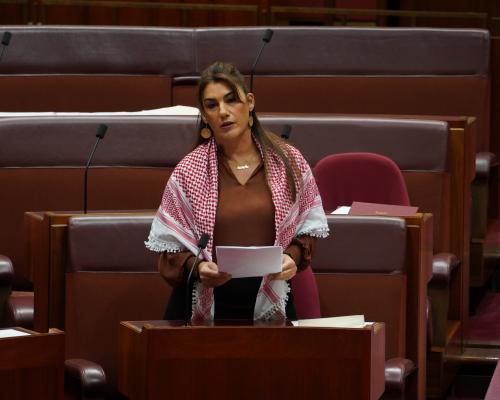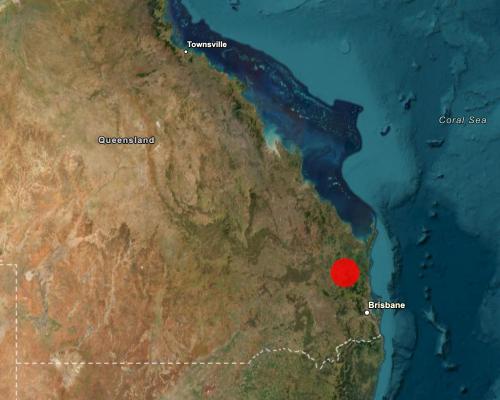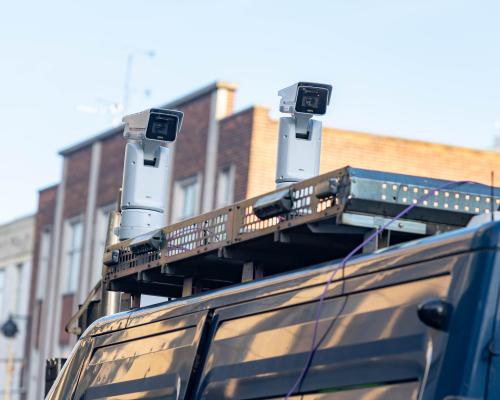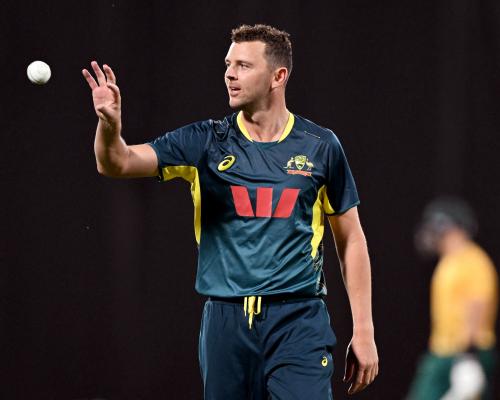
12.42am BST
RBA deputy governor says consumer price figures ‘very welcome’
The Reserve Bank’s deputy governor, Andrew Hauser, says yesterday’s consumer price figures were “very welcome”, in a further signal that the central bank has gained some comfort with the trajectory of inflation and that it will cut rates next month.
Inflation dropped to 2.1% in the year to June, while the RBA’s preferred underlying measure fell to 2.7% – which Hauser said was in line with the bank’s forecasts.
Still, Hauser also flagged that the central bank was in no rush.
Our strategy for some time is to set interest rates to bring inflation back sustainably – that’s an important word – to the midpoint of the 2-3% target range, and to do that through a policy that is gradual, considered, measured.
Financial markets are pricing in a rate cut on 12 August and another by the November board meeting.
Jim Chalmers on morning TV refused to comment on likelihood of a rate cut next month.
I try not to make predictions about decisions that the independent Reserve Bank will take about interest rates, but I’m really pleased that inflation has come down so substantially.
It’s a powerful demonstration of the progress that Australians have made together in the fight against inflation.
Updated at 12.58am BST
12.41am BST
Labor votes against Greens amendment to early childhood bill
The Senate has now moved to the early childhood bill the government has said it wants to be passed this week (ie today).
The Greens are trying to move an amendment to the bill that would note “the need for broader reform” to make early childhood education universal, and calls on the government to establish an independent national Early Childhood Education and Care Commission.
Labor votes against it with a handful of Liberal senators.
They’ll now continue debating – the minister, Jess Walsh, is currently answering questions on the bill in the chamber – before they vote on the bill.
Updated at 12.48am BST
12.33am BST
Lidia Thorpe’s condolence motion passes in Senate
Lidia Thorpe’s condolence motion extending its sympathies to the families of the 17 First Nations people who have died in custody this year, including 24-year-old Walpiri man Kumanjayi White, who died in May after being restrained by officers at an Alice Springs supermarket, has passed in the Senate.
Updated at 12.37am BST
12.26am BST
Tears as Marion Scrymgour says deaths in custody ‘catastrophic for my communities’
The Labor member for Lingiari, in the Northern Territory, Marion Scrymgour, is tearing up in the chamber, as she also speaks on Aboriginal deaths in custody.
She says two of the First Nations people who have died in custody this year have been from the area that she represents.
This issue weighs heavily on me. As an Aboriginal person from the Northern Territory, these deaths have been catastrophic for my communities. As a mother, as a grandmother, these deaths have weighed heavily on my communities.
I hear their calls for justice, Speaker.
After Kumanjayi Walker’s tragic passing in Alice Springs during Naidoc, I called for the investigation with minister McCarthy to look into his death and to have suitably qualified and authorised professionals from outside the Northern Territory police. We didn’t take that decision lightly, we did it because of the systemic racism and the issues between our Northern Territory police and Aboriginal people.
Updated at 12.39am BST
12.19am BST
Murray Watt says rate of Indigenous deaths in custody ‘unacceptable’
Both houses are speaking on Indigenous deaths in custody this morning.
After Thorpe, Murray Watt says it is “simply unacceptable that 602 First Nations people have died in custody since the 1991 royal commission”.
In the House, Amanda Rishworth is speaking on behalf of Malarndirri McCarthy:
The royal commission was clear that the best way to reduce Indigenous deaths in custody is to reduce the high incarceration rate of First Nations people, including through social and economic responses.
This is what the commonwealth government is focusing on.
McCarthy told RN Breakfast this morning that justice and preventing mass incarceration of adults and young First Nations people is a key focus of the government.
Updated at 12.32am BST
12.17am BST
Lidia Thorpe puts forward motion extending sympathies to families of 17 First Nations people who have died in custody this year
Independent senator Lidia Thorpe has put forward a motion in the Senate this morning, extending sympathies to the families of the 17 First Nations people who have died in custody this year, including 24-year-old Walpiri man Kumanjayi White who died in May after being restrained by officers at an Alice Springs supermarket.
Labor and the Greens have agreed to pass the motion acknowledging White’s death while extending its sympathies to the families of the 602 Indigenous deaths in custody since the release of the 1991 Royal Commission into Aboriginal Deaths in Custody.
The motion also called on all parliamentarians to work constructively together to address the over-incarceration and deaths of First Nations people in custody.
While moving the motion, Thorpe said:
These are not just statistics. They are sons, daughters, mothers, fathers, cousins, siblings, grandchildren – lost to a system that continues to harm our people … This motion is about preventing that pain from continuing. It’s about doing what we can, here and now, to ensure that Kumanjayi’s death is not just another entry in a long and shameful list. It must be a turning point.
Thorpe also spoke of the impact on her family after the death of her cousin, Joshua Kerr, a 32-year-old Yorta Yorta and Gunaikurnai man who died in custody in August 2022.
The motion this morning coincides with the release of the latest Closing the Gap report, which revealed only four of 19 targets were on track to be met by 2031. The 2023-24 data showed the national rate of Indigenous youths in detention had increased compared with the previous year.
Updated at 12.30am BST
12.04am BST
Jacinta Allan says there will be machete amnesty until 30 November
The Victorian premier, Jacinta Allan, is holding a press conference at West Melbourne police station before a statewide machete ban coming into effect.
From 1 September, owning, carrying, using, buying or selling a machete without a valid exemption or approval will be a criminal offence in Victoria. The state is the first in Australia to impose a ban and it follows a similar move in the UK.
Allan says there will be an amnesty period until 30 November and announced the location of more than 40 safe disposal bins that will be available 24/7 at police stations across Victoria to allow people to safely dispose of machetes.
Machetes destroy lives and there is no place for them on Victorian streets. That’s why we’ve already moved to bring about the ban on the sale of machetes – and that ban on the sale of machetes is working. We’ve already seen machetes not just being taken off the shelves of retail stores, they’re also been taken offline as well. Amazon has stopped putting machetes for sale online for the entire nation.
Updated at 12.20am BST
12.03am BST
Wiggles share post featuring Wags the Dog dressed in black after Anika Wells’ ‘black skivvies’ remark
The Wiggles have another cheeky nod to the communications minister, Anika Wells, referring to the bosses at Wiggles HQ as wearing “black skivvies” in a post promoting the children’s group’s latest tour.
Wells said yesterday she was lobbied against including YouTube in the under 16s social media ban not by individual Wiggles, but “it was the black skivvies, it was Wiggles Inc, it was Wiggles management”.
Wiggles HQ already fired back saying they don’t wear black skivvies, but in the promo video posted on Thursday it features Wags the Dog in Wiggles HQ dressed in black. The group said it was “Big Wiggles” news.
Guardian Australia reported yesterday a planned Google event in Parliament House was cancelled last night after the ban was announced. Google said it was “out of respect for the grieving families” at Parliament House who were there representing their children who had lost their lives as a result of issues such as bullying on social media.
Updated at 12.46am BST
11.59pm BST
Queensland government ‘buried’ pill-testing report
The operators of Queensland’s former pill-testing scheme have claimed the state government has “buried” a report into the now-cancelled program.
The Loop Australia submitted an RTI request for the documents but was denied on the basis that they may be considered by cabinet.
The state government closed both testing sites in April this year, a year after it opened.
About 700 people used the service during that time, according to the Loop Australia.
The Loop’s chief executive, Cameron Francis, said there would be “increases in overdose deaths in the community” as a result of the decision.
This service saved lives, reduced harm and linked people into vital health supports.
Pill-testing provides a doorway into the health system. We connect with people who have previously been reluctant to engage with the health system.
Updated at 12.08am BST
11.55pm BST
Greens say Australia should recognise Palestinian state
The Greens say Australia should join with the other nations in moving to recognise a Palestinian state, including France, as well as the UK and Canada, both who have conditions to that recognition.
Sarah Hanson-Young told Sky News this morning Australia should follow our allies but wouldn’t say whether that should be at the United Nations General Assembly in September.
I think it is a matter of time, but we’re also running out of time because people are dying, and I wouldn’t want to see this just get caught up in some kind of diplomatic, bureaucratic process … It’s time to end the illegal occupation of Gaza, to have to get aid into Gaza so that people can eat and have clean water, and we also need to recognise the state of Palestine.
The sooner Australia can lift our diplomatic voices and join with other countries in sending a very strong message … Whatever Australia can do, we should be doing.
The Greens have also been calling for more sanctions on Israel.
The deputy Nationals leader, Kevin Hogan, sitting on the Sky News panel with Hanson-Young, says there shouldn’t be a timeline for recognising Palestine.
I certainly understand the will of recognising a Palestinian state. But who right now would you do that with? There’s a peace proposal on the table at the moment from Israel, but Hamas won’t accept that. They are a terrorist organisation. You cannot deal with a terrorist organisation.
I hope they [the government] don’t put a timeline on it, in the sense there happens to be a meeting in September, so that’s when they do it. That is not the right way to do this.
Updated at 12.00am BST
11.27pm BST
Malarndirri McCarthy says more work needed to reduce Indigenous incarceration
The minister for Indigenous Australians, Malarndirri McCarthy, says she’s concerned about the number of young First Nations people in prisons.
In the Northern Territory, which McCarthy represents in the Senate, the Territory government has been defending a controversial plan to reinstate spit hoods in it’s youth detention centres, a decade after they were banned.
Youth justice is one of the areas where there’s been no improvement, according to the latest Closing the Gap data.
McCarthy told RN Breakfast a bit earlier this morning that there are prisons in Alice Springs where nearly 50% of prisoners are on remand, where young people are in overcrowded watch houses while they are going through the court process.
It’s really tough when you have states who are focused on youth, in particular with the incarceration of young, Indigenous youth, certainly in the high rates of Indigenous people across here in the Northern Territory.
Why is it that we see so many young people before the courts who are in watch houses, who are in overcrowding? Even the corrections staff have told me this, the police association of the Northern Territory has told me this. These are really worrying trends we see.
McCarthy says justice is an area the government is “pursuing vigorously” to improve but also says the areas that are improving are “heartening to see”.
Updated at 11.37pm BST
11.18pm BST
Details of PM and Keir Starmer’s phone call revealed
The prime minister spoke to his UK counterpart, Keir Starmer, last night, to discuss the war in Gaza.
We’ve received a read out of the phone call, which states “the leaders agreed on the importance of using the international momentum to secure a ceasefire, the release of all hostages and the acceleration of aid, as well as ensuring Hamas did not play a role in a future state”.
Albanese said during his press conference yesterday that he’d already spoken to Starmer before he announced that the UK would move to recognise a Palestinian state.
In the latest call, the leaders also discussed Aukus and “welcomed the progress being made by all partners”.
Updated at 11.39pm BST
11.07pm BST
James Paterson says recognising Palestinian statehood would ‘lose all leverage over the Palestinian Authority’
The shadow finance minister, James Paterson, says recognising Palestine today would mean recognising a state “which is in part governed by a terrorist organisation”.
Paterson says Hamas has shown “no interest” in demilitarising or returning hostages – two key conditions held by the Australian government.
Canada is the latest country to declare its intention to recognise Palestinian statehood, after the UK and France.
Paterson tells Sky News Australia shouldn’t follow based on an “artificial measure of momentum”.
We should only recognise that Palestinian state after peace has been agreed and achieved, because otherwise you lose all leverage over the Palestinian Authority. They desperately want to achieve this international recognition, and they would be willing to do some things in exchange for that, including forswearing their desire to destroy the State of Israel in exchange for it. But if you hand over that recognition, you have no further leverage to expect them to negotiate over.
Yesterday, Labor MP Ed Husic said momentum in Australia is building and that Hamas is “built largely on grievance”, which he said would be removed with the establishment of a Palestinian state.
Updated at 11.37pm BST
10.51pm BST
Canada announces plans to recognise Palestinian state if conditions met
This morning, Canada has announced that it plans to recognise a Palestinian state, putting more pressure on Australia to do the same.
The Australian government has said it’s a matter of “when, not if” a Palestinian state is recognised, but Canada joins key allies planning to do it by September at the UN General Assembly.
In a statement, Canada’s prime minister, Mark Carney, says prospects for a two-state solution have been “steadily and gravely eroded” by the “pervasive threat of Hamas terrorism and its “violent rejection of Israel’s right to exist”, the accelerated settlement building by Israelis and settler violence, and the “ongoing failure by the Israeli government to prevent the rapidly deteriorating humanitarian disaster in Gaza”.
Carney says the plan is conditional, and predicated on the Palestinian Authority’s commitment to reforms including:
The commitments by Palestinian Authority president Abbas to fundamentally reform its governance, to hold general elections in 2026 in which Hamas can play no part, and to demilitarise the Palestinian state.
Canada will increase its efforts in supporting strong, democratic governance in Palestine and the contributions of its people to a more peaceful and hopeful future.
Updated at 11.00pm BST
10.37pm BST
Jim Chalmers says delay in US sending new ambassador ‘not unusual’
Moving on to the Today Show, Chalmers is facing more questions about the relationship between the US and Australia.
There are a few elements to it this morning – there’s the tariff situation, the delay in the Aukus review (which the administration announced yesterday would be completed this spring, outside the original 30-day timeline), and the fact that the US hasn’t sent over a new ambassador to Australia.
It’s not super uncommon for the charges d’affaires (the second in charge in an embassy) to be the No 1 in charge for a while until an ambassador is selected.
Under the last Trump administration, Donald Trump took two years to appoint veteran Republican lawyer Arthur B Culvahouse Jr to the role – and it took another couple of months on top of that for the US Senate to approve him.
Chalmers says it’s “not unusual” for countries to take time to appoint an ambassador, and that “it hasn’t prevented us from working closely with the Americans”.
He rejects the assertion that there’s a lot of “uncertainty” in the relationship and also says it’s “not unusual” for the new government to review the Aukus deal.
Well, I’m not sure about that. I think that might be overdoing it but, more broadly, there’s a lot of uncertainty in the global economy. We’re seeing that play out. Tariffs are part of that. National security considerations are part of that as well.
Updated at 10.50pm BST
10.21pm BST
Anika Wells on social media ban: ‘We can’t police the ocean, but we can police the sharks’
The communications minister has explained the government is restricting children’s YouTube access instead of targeting social media companies’ responsibilities with an analogy that while it is impossible to police the ocean, they are “going to have a crack” at policing the sharks.
Anika Wells appeared on ABC’s 7.30 program yesterday evening after news this week that children will be banned from having YouTube accounts from December, with the federal government backflipping on an earlier decision to exempt the video platform from the national under-16s social media restrictions.
In response to being asked if the bigger question was not why social media companies are putting vile material on their platforms in the first place, Wells said:
It is a question for the social media platforms. YouTube uploads 500 hours of content every 60 seconds. If you could put all of that social media content in a library, it would be the world’s worst library. You wouldn’t allow your child to walk into it, but the internet is here. The internet is ubiquitous. I’ve got little kids. We are all trying our best. Parents are trying their best, but it is like trying to teach your kids to swim in an open ocean with rips and sharks rather than at the pool. We can’t police the ocean, but we can police the sharks. We’re going to have a crack at it.
Wells said the government remains committed to a plan that will also see legal responsibility put on social media companies to prevent harmful content on their platforms.
Updated at 10.32pm BST
10.17pm BST
Chalmers says recognising a Palestinian state ‘a matter of when, not if’
On to international issues, Chalmers is asked whether Australia could recognise a Palestinian state by September for the UN meeting – as the UK said it will do, unless Israel takes “substantive steps” to end the conflict and commit to a peace process.
Chalmers says he won’t put a timeframe on it but it’s “a matter of when, not if” – echoing comments made by both the prime minister and other ministers yesterday.
There are a number of obstacles still in the way to recognition of a Palestinian state. For example, the treatment, the release of the hostages, making sure that there’s absolutely no role for Hamas. These are the sorts of things that the international community is working through. But that statement that came out yesterday that we signed as Australians via our foreign minister, Penny Wong, is a really important one.
Chalmers is also asked about the tariff situation and says the government hasn’t “heard any different from the 10% baseline that’s been levied on Australia”.
Donald Trump has said this week more countries could be levied at 15% to 20%. Chalmers won’t rule out Australia being hit with a higher rate.
I think it would be a brave person to assume that there won’t be, whether it’s with other countries or – there will always be more announcements about this. These tariff announcements are a moving feast. But our expectation is we get the baseline.
Updated at 11.28pm BST
10.13pm BST
Jim Chalmers says Australia ‘needs to do much better’ on Closing the Gap
Jim Chalmers starts on ABC News Breakfast this morning. He’s pretty happy with the inflation numbers and says the first two rate cuts this year were “very, very welcome” relief, but he won’t predict if there’ll be another.
Asked about the latest Closing the Gap data, Chalmers says Australia “needs to do much better” and that some outcomes have gone backwards in “worrying ways”.
Minister Malarndirri McCarthy is working in her characteristically diligent way with all of the stakeholders, all of the communities, to try to turn these numbers around. There has been progress in 10 of the 15. There has been some worrying outcomes in the rest, but overall, we need to do more and we need to do better.
McCarthy and the prime minister will be visiting the Garma festival next week, held in remote north-east Arnhem Land.
Updated at 10.29pm BST
10.06pm BST
Good morning,
Krishani Dhanji here with you for the final sitting day of the fortnight, thanks to Martin Farrer for getting us started!
Jim Chalmers is doing the media rounds this morning, off the back of what he called “outstanding” inflation data yesterday.
The government has said it wants its childcare bill to be passed through parliament this week, which leaves today for it to be voted through the Senate (it has the support of the Coalition and the Greens).
And as Martin brought you earlier, we’ll be following the reaction to the latest Closing the Gap data.
Stay with us, it’s going to be a big one!
9.59pm BST
Closing the Gap review finds community controlled organisations key to progress
The new data follows a recent review of the Closing the Gap agreement, commissioned by the Coalition of Peaks.
The review found Indigenous community controlled organisations are key to progress, and governments must listen to First Nations people and share decision-making power to create positive change.
Productivity commissioner Selwyn Button said the review shows the outcomes of the agreement are falling well short of what governments have committed to.
What the outcomes in the agreement reflect most of all is the limited progress of governments in collectively acting on the priority reforms: sharing decision-making and data with communities; strengthening the Aboriginal community controlled sector and changing the way governments operate.
Coalition of Peaks Lead Convenor Pat Turner said improvements in early education enrolments, employment and land and sea rights show what’s possible when government partner with Indigenous organisations “in the right way”.
But she said when governments fail to meet their commitments to work with community controlled organisations the gap widens.
What’s important for Australians to understand is that Aboriginal community controlled organisations are not fringe services.
We’re not asking for special treatment. We’re asking for a fair share. When we get that, we deliver.
Updated at 10.20pm BST
9.51pm BST
These are the Closing the Gap socioeconomic outcomes in the latest report in detail:
-
89.2% of babies were born with a healthy birthweight (improvement, but not on track)
-
94.2% of children were enrolled in preschool (on track)
-
33.9% of children commencing school were developmentally on track (worsening)
-
2,304 out of every 100,000 adults were in prison (worsening)
-
26 out of every 10,000 young people were in detention (no change)
-
50 out of every 1,000 children were in out-of-home care (worsening)
-
31 out of every 100,000 people took their own life (worsening)
-
4.3 million sq km of land were subject to Indigenous rights or interests (on track)
-
113,517 sq km of sea were subject to Indigenous rights or interests (on track)
-
88% of people used the internet (no assessment)
Updated at 10.31pm BST
9.42pm BST
Closing the Gap results ‘unacceptable’
“It’s not enough to hope the gap will close, governments must hold themselves to account for the commitments they’ve made under the national agreement,” Coalition of Peaks lead convener Pat Turner said of the latest Closing the Gap report.
“That requires smart investment, longer-term flexible funding and full implementation of the four priority reforms – shifting power, not just policy.
“Without real power shift, we’ll keep seeing the same patterns repeat, and our people will continue to pay the price.”
The Queensland Aboriginal and Islander Health Council chief executive, Paula Arnol, said the latest Closing the Gap report card was disappointing.
“It’s 2025 and Aboriginal and Torres Strait Islander people are still not experiencing the health outcomes that non-Indigenous Australians enjoy. This is unacceptable,” she said.
Updated at 10.33pm BST
9.32pm BST
Only four Closing the Gap targets on track to be met
Without changing the approach to Closing the Gap, Aboriginal and Torres Strait Islander people will continue to “pay the price”, Indigenous organisations say.
Just four of the 19 Closing the Gap targets are on track to be met, according to the latest data from the Productivity Commission, Australian Associated Press reports.
But key targets, including adult imprisonment rates, children in out-of-home care, suicide and childhood development, are continuing to worsen.
While there have been improvements in year 12 attainment, tertiary education and housing access, these are not on track to meet deadlines.
Updated at 10.04pm BST
9.28pm BST
Welcome
Good morning and welcome to our live politics blog. I’m Martin Farrer with the top overnight stories and then it will be Krishani Dhanji with the main action.
The latest Closing the Gap report has been released this morning and it shows that progress is being made on only four of the 19 targets. Indigenous groups and advocates say governments need to do more. More details coming up.
Anika Wells, the communications minister, appeared on 7.30 last night to explain the government’s decision to restrict children’s YouTube access. More details coming up on that as well.





